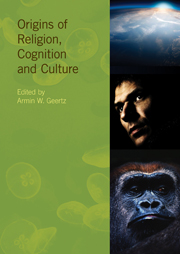Book contents
- Frontmatter
- Contents
- Contributors
- Introduction
- Part I EVOLUTIONARY SCENARIOS
- 1 Whence religion? How the brain constructs the world and what this might tell us about the origins of religion, cognition and culture
- 2 Why “costly signalling” models of religion require cognitive psychology
- 3 The prestige of the gods: evolutionary continuities in the formation of sacred objects
- 4 The evolutionary dynamics of religious systems: laying the foundations of a network model
- 5 Art as a human universal: an adaptationist view
- 6 The significance of the natural experience of a “non-natural” world to the question of the origin of religion
- 7 Religion and the emergence of human imagination
- 8 The origins of religion, cognition and culture: the bowerbird syndrome
- 9 The will to sacrifice: sharing and sociality in humans, apes and monkeys
- 10 Apetales: exploring the deep roots of religious cognition
- Part II COGNITIVE THEORIES
- Index
9 - The will to sacrifice: sharing and sociality in humans, apes and monkeys
from Part I - EVOLUTIONARY SCENARIOS
- Frontmatter
- Contents
- Contributors
- Introduction
- Part I EVOLUTIONARY SCENARIOS
- 1 Whence religion? How the brain constructs the world and what this might tell us about the origins of religion, cognition and culture
- 2 Why “costly signalling” models of religion require cognitive psychology
- 3 The prestige of the gods: evolutionary continuities in the formation of sacred objects
- 4 The evolutionary dynamics of religious systems: laying the foundations of a network model
- 5 Art as a human universal: an adaptationist view
- 6 The significance of the natural experience of a “non-natural” world to the question of the origin of religion
- 7 Religion and the emergence of human imagination
- 8 The origins of religion, cognition and culture: the bowerbird syndrome
- 9 The will to sacrifice: sharing and sociality in humans, apes and monkeys
- 10 Apetales: exploring the deep roots of religious cognition
- Part II COGNITIVE THEORIES
- Index
Summary
In our species the reciprocity principle is the basic ethic behind any society we know: you have to give in order to get, and to reciprocate what you receive. Such is the rule — the expectation or code, if you like — universally (Mauss [1925] 1990; Gouldner 1960; Høgh-Olesen 2006). Or as George Simmel (1950: 387) formulated it: “All contracts among men rest on the schema of giving and returning the equivalence.”
This world's key religious and moral texts are similarly full of stringent requests for sharing and examples of radical self-sacrifices, and modern anthropology's studies of hunter—gatherers' rules of sharing worldwide basically confirm these ethics. Food and resources are shared on the basis of egalitarian and reciprocal principles (Kaplan & Hill 1985; Betzig & Turke 1986; Testart 1987; Lee 1988; Ingold 1988; Hames 2000; Hill 2002), and they are shared on a large scale. Hawkes (1991) has shown that around 84 per cent of a hunter's prey is consumed by others than himself and his nearest family, while 58 per cent of the women's yield is eaten outside the family (Barret et al. 2002: 82).
Bearing in mind the enormous ecological and cultural diversity that otherwise characterizes these societies — and we have data from Arctic areas (Damas 1972), from the South African bush to the Equatorial rainforest (Hart 1978), and from the Australian desert (Gould 1967) — it is thought-provoking that common patterns of sharing even exist.
- Type
- Chapter
- Information
- Origins of Religion, Cognition and Culture , pp. 203 - 218Publisher: Acumen PublishingPrint publication year: 2013



